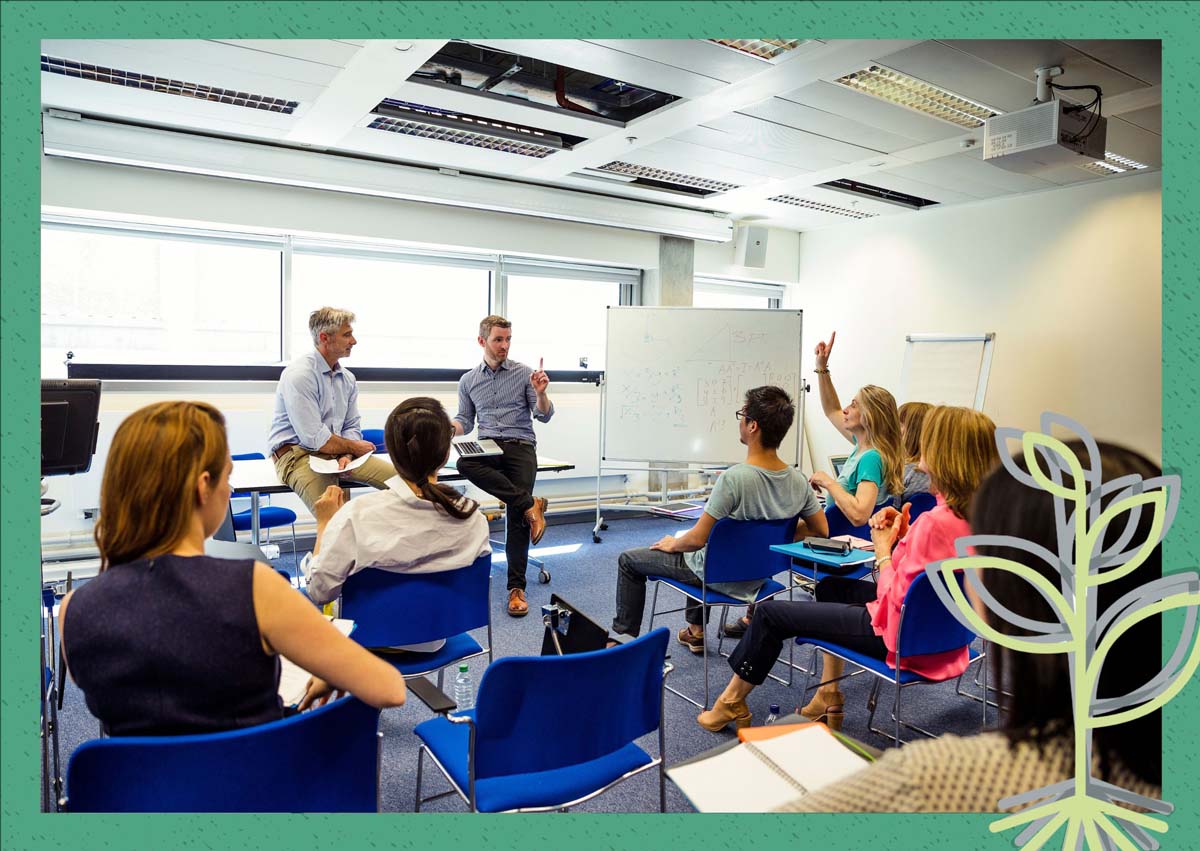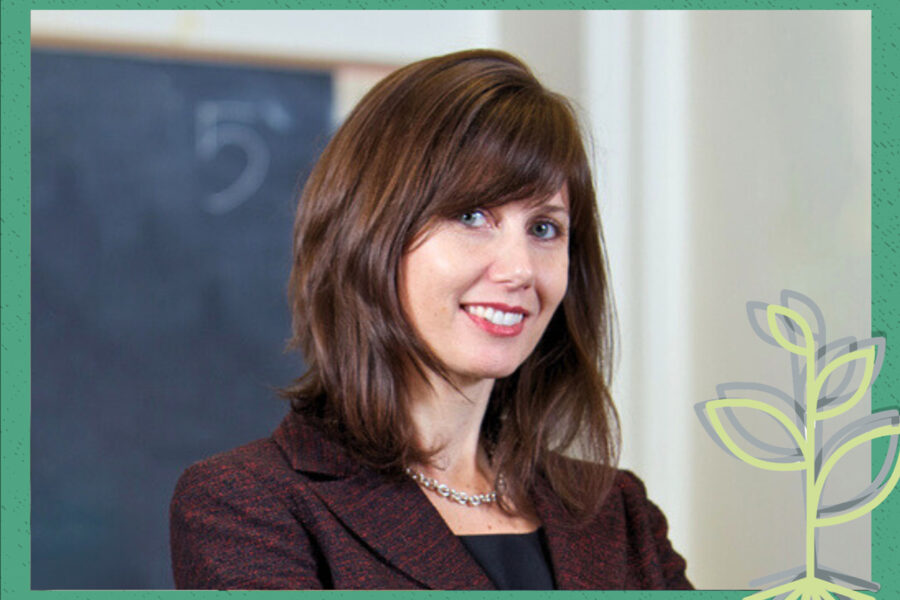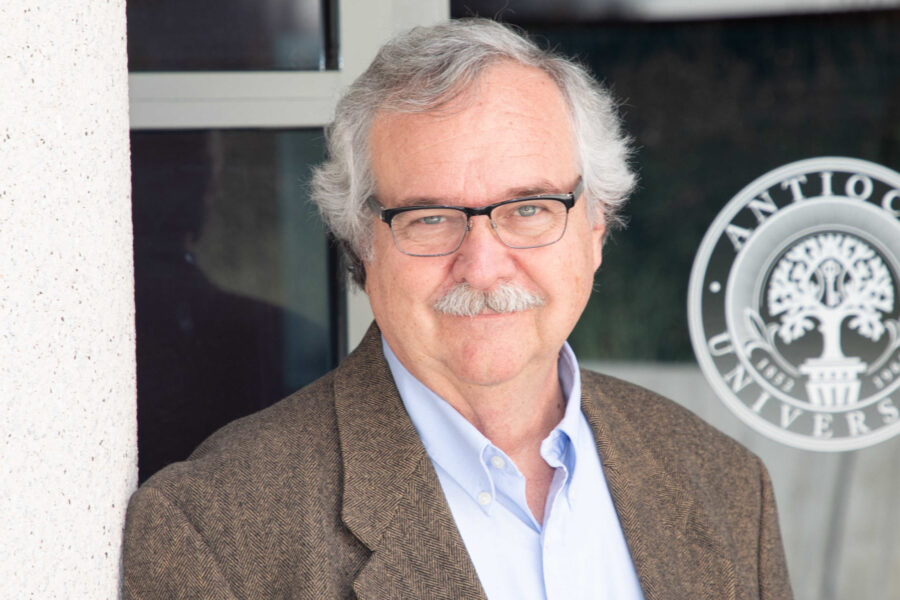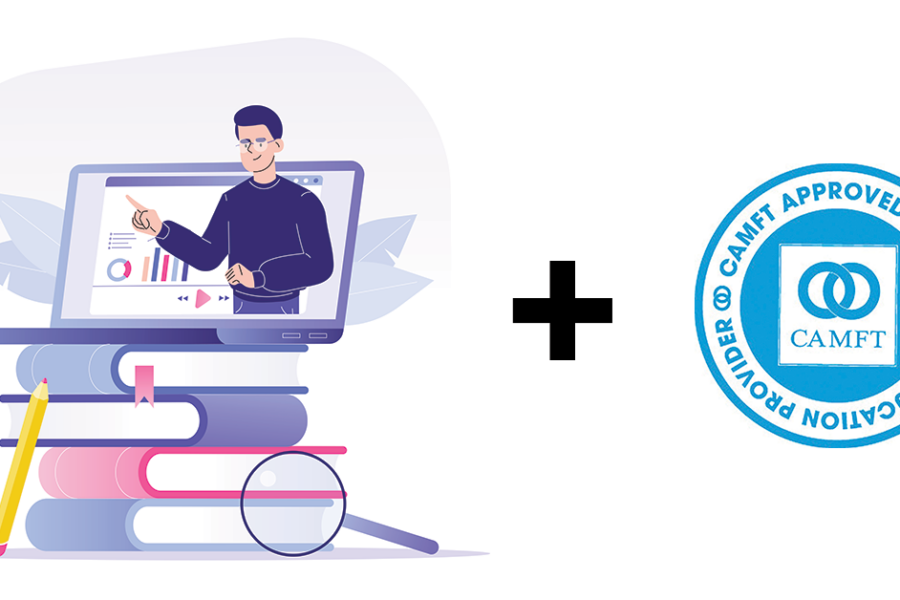A conversation with Terry Ratcliff about the power and place of continuing education for universities and life-long learners.
Episode Notes
Universities across the country are offering more and more classes outside of degree programs. These include job training programs for employers, continuing education credits required to keep certifications, and more creative classes that serve a personal interest. But why should universities be the place where we go to be life-long learners? And how do universities need to change to embrace this opportunity? In this interview with Terry Ratcliff, the Dean of Antioch’s School of Distance and Extended Education, we answer these questions and more.
The School of Distance and Extended Education that Terry has been talking about offers classes, certificates, and badges in lots of different areas, and you can visit its website at continuinged.antioch.edu. We’ll add that link in our show notes.
We’ll also link there to where you can sign up for the Continuing Education newsletter, which is the best way to keep up with their latest offerings.
Visit Antioch’s website to learn more about the Continuing Education offerings of the School of Distance and Extended Education, where Terry is dean. To stay up-to-date with the latest offerings, sign up for the Continuing Education Newsletter.
This episode was recorded November 8, 2023, via Riverside.fm and released December 13, 2023.
The Seed Field Podcast is produced by Antioch University.
Host: Jasper Nighthawk
Editor: Johanna Case
Digital Design: Mira Mead
Web Content Coordination: Jen Mont
Work-Study Interns: Carrie Hawthorn, Stefanie Paredes, and Georgia Bermingham.
A special thanks to Karen Hamilton, Amelia Bryan, and Melinda Garland.
To access a full transcript and find more information about this and other episodes, visit theseedfield.org. To get updates and be notified about future episodes, follow Antioch University on Facebook.
Transcript – S6E4 – Terry Ratcliff
(upbeat music)
[00:02] Jasper Nighthawk: This is the Seed Field Podcast, the show where Antiochians share their knowledge, tell their stories and come together to win victories for humanity. I’m your host, Jasper Nighthawk.
Today we’re joined by Terry Ratcliff for a conversation about continuing education and the ways that universities are changing their offerings to support the ongoing education of people throughout their adult lives. I’m interested in this subject in part because I don’t actually know that much about the work that universities are doing, offering classes and programs that aren’t connected to a specific degree. And I don’t think that I’m alone in that. For a lot of us, when we conceptualize a university, we think of a bunch of people getting bachelor’s degrees, master’s degrees, maybe PhDs or doctor of education, or maybe getting an MD to become a doctor.
But here at Antioch and at universities across the country, continuing education is a growing part of what we offer. And I’ll say, I do understand on the viewpoint of the university, why this is a good idea. There are only so many people seeking degrees and there are actually fewer college-age students today than there were a decade ago. And degrees are also completed in maybe two or three years. So I could see how offering job training or other continuing education throughout a potential student’s entire lifetime offers a big market for universities to address.
But I’m most curious about how this works from a student’s point of view. Why are people signing up for these courses? What do they offer for those of us who consider ourselves lifelong learners? And should we be looking more and more to universities as places for ongoing job training, even in mid-career?
So to answer these questions, I have here in the studio with me, Terry Ratcliff. Terry is the Dean of Distance and Extended Education here at Antioch University. And that means he’s the main person in charge of our School of Distance and Extended Education. He’s also the President-Elect of the Association for Continuing Higher Education, which means that next year he’ll be the President. He recently returned from that national organization’s annual conference. So he’s just spent some time talking with others in the field about the biggest trends that they see in the field of continuing education. I think Terry is the perfect person to help explain why continuing education is important and why in the coming years and decades, more and more of us will be returning to university settings to top up our skills. So with that big introduction, Terry, welcome to the Seedfield podcast.
[02:46] Terry Ratcliff: Thank you, Jasper.
[02:47] Jasper: So we always start the show by asking guests to disclose their positionality, especially when it’s relevant to the topic we’re discussing. And here we’re gonna be talking about education and employment, two variables that historically have been strongly correlated to race, gender, income, and more. I think it’s useful for listeners to know that I, asking the questions here, I’m a white cisgendered man. I have an advanced degree. I currently have steady housing and income, though these are precarious. And I’m not currently living with a physical disability, though I do experience anxiety and depression. Terry, I would throw it over to you. As much as you’re comfortable, can you share the positional details that you’re bringing to this conversation?
[03:27] Terry: I am a cisgendered white male. I use the pronouns he, his, and I’m also a first-generation college student with two advanced degrees
[03:38] Jasper: That’s great. And I wanna draw you out a little bit more about who you are and what brought you to this work. So I’m curious, how did you get interested in adult education?
[03:49] Terry: Adult education is really my second career. Initially, I went to college directly out of high school. So I was a traditional college student. While I was there, I worked in student housing and I decided that my career path was going to be in traditional college student services. So I worked in student housing, student activities, student orientation, but several years into my career, one of the areas that I was working in was orientation and academic advising. And I started working with non-traditional students. I was at a very traditional residential public institution. So we had very clearly defined parameters of what we did and what our students were like.
[04:37] Jasper: And I’m guessing your students were mostly like 18 to 22.
[04:39] Terry: Exactly.
[04:41] Jasper: Okay.
[04:42] Terry: And so I began working with a lot of transfer students. And so within the transfer student population were students who took three, four, five years or more to finish the first two years of the degree. So they were older, many of them were coming back and they just didn’t fit the mold of a college student at this traditional residential university. But I also began to realize that I was a lot more like them than I was like our traditional students. That being a first-generation student coming from a blue collar background. And so I really started honing in on their challenges and the roadblocks that they were seeing. And so when I continued my graduate work, I started focusing on first transfer students and then more broadly adult learners. And so when I finished my doctorate, I shifted to working with adult learners. First, adults who were coming back for college degrees. And that’s really the beginning of continuing education is what we used to call night school. And so that was adults who couldn’t go to school during the day because they had a job, would come to night school to finish either their high school diplomas or their college degrees. That was the foundation of the field. And then life changes and life changes faster now than it used to. And so in your comment before about why would an individual, you know, be interested in continuing education. Well, we really have taken on more of a lifelong learning mindset as a society. And we know that what we are learning today is going to be obsolete in 20 years, 10 years, even sooner. So it’s not uncommon for people to have to go back for new training or to expand their skills to either stay in the careers that they’re already in or to make a career shift.
[06:55] Jasper: Yeah, so it seems like when you bring up things like night school, that’s still often, at least traditionally, was in the realm of working towards a degree and working to finish a degree.
[07:06] Terry: Right.
[07:07] Jasper: Okay. So then can you explain what non-credit degree programs are?
[07:11] Terry: Sure, so to get a college degree, you have to accumulate a certain number of credits. For an undergraduate degree, you need 120 semester credits. But a lot of people really aren’t interested in a college degree anymore. They really want to focus on the skills they need right now. So it’s more a just-in-time approach to education. So some students will come back and just take a course or two that directly addresses their interest, economics, accounting, whatever that is. So they still accumulate credits, but more and more people are looking just at the skills. They’re not really interested in accumulating credits to eventually get a college degree. So more and more of our training is workshops that don’t have college credit associated with them. They don’t lead students eventually to a degree necessarily. And they’re very short-term focused. So an individual might be working in an office and they realize that in order to advance in their career, they need some additional skills in accounting, in some computer platform. So that’s the type of learning they’re going to seek out. And it’s not going to be a three-credit course in the introductions to accounting. It’s going to be a short-term workshop that addresses the specific types of accounting that they need for their job. So they’re not earning credits. They’re not working toward a degree. They’re focused solely on job advancement.
[09:01] Jasper: Yeah, so that makes sense. So there’s a specific need inside their career path that they see. And it’s not necessarily, I need to get a master of arts in economics or a master of accounting, or even that I need to get a quarter of that by taking a few courses. It’s more like I need to know how to use this specific piece of software, or I need to have an insight into broader trends inside my field. So that gives me a sense of why somebody would want to study in a program like this. Are there circumstances where professions are actually requiring that people pursue continuing education?
[09:38] Terry: So that’s an interesting question. There are companies, corporations, there are fields where you have to stay current in your field. So there is professional continuing education that is required of people in certain fields. Counseling is an example. Medical fields are examples where you have to go back for continuing education. You really are expected to be a lifelong learner to stay current in your field.
[10:06] Jasper: That might be like a requirement to keep your license current as a therapist. You have to present so many continuing education hours.
[10:14] Terry: Right, exactly. There are other fields where instead of looking for a college degree, the employer might be looking for these specific skills and those things can be evidenced through badges, certificates. So they’re not college degrees. They are much shorter term items, but they’re usually much more specific. And we see a lot of that now in that employers are really looking for evidence that individuals have training. And so we have electronic badges now that people can get that they can attach to their electronic resume or to their LinkedIn site where an employer can click on that and see exactly what was entailed in getting that particular badge, where it came from, how many hours were involved in it. We’re seeing more and more employers looking in that direction.
[11:12] Jasper: I was hoping you could, as we’re just getting these definitions out here, talk through what badges and certificates mean. ‘Cause that seems like it’s different from just taking like one specific class or a weekend class.
[11:24] Terry: Yeah, typically both badges and certificates, they’re evidence that you have completed a series of learning events. You might attend two or three workshops in a topic. And when you finish those three workshops, you would get a badge, which as I described before, can show exactly what you’ve accomplished. Certificates are another award that people can get as they accumulate more and more experience in a particular area. So a certificate shows that you have a certain level of learning, not to the same level that you would have if you were looking at a particular college degree. So those are different ways of documenting the type of learning that you have.
[12:12] Jasper: Yeah, I mean, it really adds to the menu that a university can offer. And I’m curious, how are accrediting bodies approaching these? Are they sort of outside of the purview of accreditors?
[12:23] Terry: Yes and no. The actual certificates, badges, typically a regional accrediting body wouldn’t look at those awards. They would look, however, at the quality of education that’s going into those types of workshops. It used to be that the accrediting bodies didn’t worry about continuing education at all. But just in the last 10 years, as this area has grown more and more, regional accrediting bodies now, when they come in to review an institution, will also look at the continuing education offerings of an institution.
[13:04] Jasper: That’s so cool.
[13:06] Terry: Yeah, there are professional accrediting bodies that again, get back to licensure type things. Those accrediting bodies are very keyed in to exactly what happens in continuing education and often have higher expectations for what happens in whatever it is that leads to that badge or that certificate. And they are closer to academic standards than you’d see otherwise.
[13:34] Jasper: Yeah, I remember there was here at Antioch, a big deal when CAMFT, the California Association of Marriage and Family Therapists officially said Antioch is approved to offer continuing education courses.
[13:47] Terry: Right, we’re an approved provider for CAMFT, we’re an approved provider for several other professional organizations, but that’s relatively new avenue that we’ve taken at Antioch so that we can get broader reach, we can bring people in who are looking for those kinds of certifications that wouldn’t have been interested or would not have benefited from taking continuing education from us in the past.
[14:14] Jasper: Yeah, it’s really useful to hear that there are these outside organizations that are overseeing it and are saying, yes, this is in fact quality education and are pushing for that. Because it makes sense, those accrediting bodies are supposed to be holistically making sure that universities are doing a good job in educating. And as this is more and more something that universities are offering, it seems like they should be paying attention to continuing education as well.
[14:43] Terry: Well, and it also provides a level of assurance when individuals are taking these training activities at an organization that’s not a university that otherwise wouldn’t have standards in place so that the learning that they get from those organizations have the same level of quality as well.
[15:07] Jasper: That’s a question that I had coming into this conversation. I know that a lot of continuing education has historically taken place at, especially big corporations will have an internal kind of educational wing that will teach employees how to use software, but also maybe we’ll do executive coaching or all sorts of things. And I guess one question I was asking is, why have this on a societal level offered at universities rather than inside corporations or maybe in another location?
[15:40] Terry: Well, because not everyone works at Microsoft or AT&T or the large corporations that have the resources to have that kind of training. So it’s a benefit both to the employee and to the employer to have opportunities to get this ongoing training from a university or from another entity that small employers don’t have the human resources or financial resources to provide the kind of training that a large organization would provide. So they need a resource.
[16:18] Jasper: So in some ways you’re saying a smaller organization, say somebody with maybe a hundred employees could partner with Antioch University and make sure that whatever subset of their employees who needed this training could get it by people who are professional educators.
[16:33] Terry: Exactly, and we’re doing that now. We are creating partnerships with both for-profit organizations and nonprofit organizations that don’t have those resources. And they look to us because we have a lot of subject matter experts depending on what area they’re in. And the advantage that we have is if we don’t have a subject matter expert in our full-time faculty, we have resources through our adjuncts who are actually working out in the field that we can bring in that have hands-on experience. I’m developing a program with an organization that wants to do training for their call center employees and in their small organization so they don’t have the resources to do it themselves. We don’t really have a faculty member necessarily with that expertise, but I have an adjunct who used to coordinate the call centers at Microsoft.
[17:34] Jasper: Oh, wow.
[17:35] Terry: So she can come in and provide them with very relevant expertise in that area and really help them know, from the job perspective, what is it that you need to know to be successful? And again, we’re increasingly doing that with organizations, particularly with some nonprofit organizations that don’t have, particularly the financial resources. So we can come in and provide them and we can pool different small organizations together in order to have a critical mass to offer a workshop that their employees or that their clients can take to advance themselves. So I’ve talked about how it’s beneficial to employers. Let me talk a little bit about how it can be beneficial to individuals as well, because an individual may be working in an organization that’s not really where they want to spend the rest of their life. It’s not their career choice to be either in the job or at the organization they’re with. The organization may not have the mission and vision that fits with the individual’s own personal mission and vision.
[18:49] Jasper: Yeah, I don’t think our listeners have to imagine too much to imagine reasons why they might want to aim for something else eventually.
[18:56] Terry: Right, so they’re not going to get the kinds of training that they’re looking for through that organization. So they need a source outside of work. So a university can provide that source. Again, we have a huge amount of subject matter expertise so we can provide a lot of different programs. We can do it hopefully in a way that is affordable, particularly an institution like Antioch. A lot of the things that we stand for are not popular in society today. We have a strong social justice mission. So what we teach even in our continuing education offerings focus on a social justice lens. So we might look at leadership differently than someone who would take a leadership course from a large corporation. So we provide a different perspective for students than they would get in some of those corporate programs.
[20:02] Jasper: Yeah, that makes a lot of sense and helps answer why you would turn to a university to do this. Antioch University, but also many universities are nonprofits or are state institutions. And so because of that, they have values that are not necessarily solely the profit motive.
[20:20] Terry: Exactly.
[20:22] Jasper: Yeah, and that gets to a bigger question that I wanted to kind of zoom out and ask, which is how do you see continuing education helping to address some of the present problems that we’re facing as a society?
[20:34] Terry: Well, I think we are positioned well to address some of the social issues that are present today. Again, because since we are an unaffiliated nonprofit organization, we’re not beholding to other entities. State institutions are having a lot of difficulty providing training around DEI types of things because the states are no longer supportive of those types of programs. So a lot of my colleagues in state institutions, this was part of the conversation that was going on at the conference that I was at, have had to dial back the types of programs and activities that they do, even though they’re self-supporting, they’re still at a state institution. And so a legislator raises an eyebrow about what they’re presenting and it’s not consistent with their political agenda. Well, we don’t have to worry about the legislator in the way that a state supported institution does. So we can be sort of at the fringes and push for social change that other institutions couldn’t do.
[21:50] Jasper: Yeah, that makes a lot of sense. And I’m also curious about access for people who may want or would benefit from continuing education, but either the barriers that they’ve faced so far, like poverty, unemployment, or they’re from a group or a community that hasn’t traditionally or in the past had access to these sorts of opportunities. I’m curious how you and others in this field are approaching that question.
[22:19] Terry: Yeah, that’s even more of a challenge in continuing education than it is in degree programs because our students aren’t eligible for the kinds of federal and state assistance that students in a degree program would get. One, we have to be much less expensive in our continuing education offerings. We still have to be able to pay for it, but we’re much less expensive. One way that we’ve been able to address that issue of the potential students not having financial assistance is working through community agencies, community organizations. There are organizations out there that get funding to provide support for people to get professional training. And so we can key in with those organizations, provide the content that’s needed for their clients to get the services that are paid either through public funds or through private foundations. So we can funnel those funds and pay for our programs so that it’s not as cost prohibitive for some of our prospective students. Also, when we can pair with a private corporation that has a similar mission and vision to what we have, and they’re really looking for the same types of things that we have, then if an individual is working in a low-level position in one of those organizations, and that organization wants to provide training to enable that employee to work up within the organization, have some sort of career ladder, then we can provide that training. And we are, again, mission and vision aligned to what that organization is about as well.
[24:14] Jasper: Yeah, that makes a lot of sense. And I wonder also how you see continuing education tying into larger degree programs. You mentioned that there are shared resources when it comes to staff, and when it comes to obviously IT and delivery, the whole university is engaged in this effort. But do you see students moving from continuing education into degree programs? Are there ways that they do sometimes receive credit that can later be counted towards a degree?
[24:47] Terry: Yeah, so that’s been the downside of this move toward lifelong learning and non-credit activities. A lot of times, an individual will do some non-credit continuing education. They might spend six months, they might spend a year in several different workshops in an area that interests them. And they did this short-term learning because that’s what they needed in this just-in-time world of getting the training they needed to move forward where they are. But then they realize, wow, I’ve spent a year doing this, and I really like this topic. I think I really would like to go on and get a bachelor’s degree or work toward a graduate degree. But traditionally, all that work that they did in the non-credit area doesn’t count for anything. So there are a couple of different ways that institutions have addressed that challenge. And it’s becoming an increasing challenge as more and more people are going that route rather than going into a formal educational program. We’ve had a process in place for many years called prior learning assessment. And what we do through prior learning assessment is we can take things that people have learned outside of the traditional classroom, and we can assess if it is equivalent to what they would have learned if they had studied that in a classroom. And many times we’re able to award credit to people for things that they’ve learned in some of these non-credit arenas. But that, quite honestly, that doesn’t cover most of what they’re doing in the non-credit arena. A trend that’s been growing in the last few years is the trend of stackable badges and stackable certificates. And what we mean by that is a student might begin in a non-credit area, and again, they decide, wow, I really like this. We design the programs intentionally that they literally stack on top of each other. Level one workshop is at a particular, the learning objectives are in a particular area. The next workshop is at a higher learning objective. And then we start doing assessment, which is a critical piece of academic work. So the more of these workshops, the more of these certificates you do, they stack on top of each other. And eventually you’ve got a collection that’s worth X number of credits. And so the student can start out saying, I really don’t want academic credit. I just want these skills. But then they can start building toward academic credit. So all of that work that they did is not for nothing.
[27:43] Jasper: I have heard about prior learning credits, which is a hallmark of Antioch’s offerings. In fact, my dad is a graduate of Antioch, San Francisco, and he got prior learning credit for his work. He’d done studying map making and then digital cartography. He was really into maps, and he was able to document that he engaged in all of these different activities and turn that into college credit, and then took a few more courses, and he was able to finish a degree where he had dropped out after three years in college. And it seems to me very interesting to think about repurposing the technology of prior learning credits to formalize as college credits learning that occurs in these non-credit programs. It seems interesting, but maybe also a little bit inelegant. This is like an open question of after you move away from credit programs where you’re awarding semester, hour credits, then what do you do when the person does want to return for a degree and this work doesn’t apply?
[28:49] Terry: Yeah, and the traditional institution will say, I’m sorry, but that doesn’t count. You’ve got to come in and take your 120 credits. Whereas Antioch as an institution has always been able to look at what they’ve done. We try and accept the student where they are and figure out what it is that they’ve done that we can apply to that degree. But most institutions, particularly a traditional residential institution that’s built on four years of spending time here on this campus, they still to this day are very strict on what they will accept in terms of transfer credit. And that’s why we see a lot of the students that we do is they aren’t able to get through that traditional pathway. They’re a square peg in a round hole, which is what the students were that I was working with back originally when I made this shift.
[29:42] Jasper: Yeah, I really feel your enthusiasm for meeting the needs of students who are not these traditional college age students and maybe are not even people who need a degree right now. But trying to really reach people where they are and get them what they need. And I was hoping that you could tell us about some of the programs that you’re offering here at Antioch that are like most exciting to you right now.
[30:08] Terry: Sure, so we’ve got a couple of things going on. We have a program that’s focused on women and leadership. And in this program, we create safe spaces for women to be in dialogue with each other. And really look at leadership through their own experience and their own lens. And right now we’re looking at women who are in mostly mid-level management, upper level supervisory positions and really giving them the skills they need to move to that next level. Again, through a positionality of being a woman in today’s organization. So that is a really exciting program that we have. I described the program that we were working on with the call center. I think that’s a really interesting thing that we can take to other organizations that have the same needs. Because what they’re seeing is from the employer’s perspective, they’re seeing huge turnover. So they wanna stop that turnover. And we have a way to provide the skills that their new employees need. Because most of these people are not people with a college degree. So they haven’t learned those things that we would learn in some of our soft skill courses as an undergrad.
[31:28] Jasper: Can you describe when you’re thinking about designing a course for a call center, some of what might go into that?
[31:35] Terry: So the organization actually identified several skillsets that they wanted their employees to learn. And some of them are what you would expect, interpersonal communication, conflict management, handling the difficult customer. But they also, because all of their workers are now working remotely, they wanted to spend some time around technology and being able to troubleshoot initial technology issues like we all have when we’re in a Zoom meeting. And making sure that they have basic skills in the software that we typically use in business. So email etiquette and using spreadsheets and those types of things. But then interestingly, they also wanted to focus on some personal development. Because again, they’re looking for people who will stay with the organization and move up in the organization. And when I described this to one of the faculty members who was developing the curriculum, she was surprised because they’re talking about ways to build your own brand and market yourself. And that seemed like they’re wanting to train people in order to find a job somewhere else. Well, that is somewhat true, but they’re also wanting people to be able to present themselves within the organization and be able to move up within the organization. So they’re starting to look at retention issues of their own employees, which I thought was interesting.
[33:10] Jasper: Yeah, that’s so interesting. I mean, it sounds like retention might also just, if you feel like you’re in a place where you’re being cultivated and you’re building skills and you’re able to do your job effectively, maybe after four years you’ll leave, but that’s different than leaving after six weeks. The organization might be quite happy if all their employees stayed for four years.
[33:32] Terry: Right, and that may actually be their expectation. Their goal may be to keep someone for two years, which might not sound like that much, but if your average right now is six months, two years is a pretty good improvement.
[33:44] Jasper: Yeah, and worth paying for, compared to the cost of recruiting a new employee and training that person.
[33:50] Terry: Right.
[33:51] Jasper: Yeah, so as a closing question, I’m curious, when you look to the future of this field and to the future of the work that you might be doing here at Antioch, what makes you excited to be doing this work?
[34:04] Terry: Well, I’m excited to be at Antioch right now because we are building these types of programs and this approach to lifelong learning that then can fold into academic programs if that’s what the learner wants. So I’m excited to be at an institution that is investing the time and money to get that launched. I’m excited to be in the field of continuing education because it’s actually a growing field. More and more institutions are realizing that this is a population that they haven’t been addressing. And with the declining enrollment of traditional-age college students, they’re gonna have to shift. And so this is an area where they will need to shift. So there will be a demand for a lot of these young professionals that I’m working with in the association, that there’ll be jobs for them because institutions need to make this shift. Institutions that don’t make the shift won’t be around in another 10, 15 years.
[35:12] Jasper: Yeah.
[35:13] Terry: So both, I’m excited to be at Antioch as we make this shift and build up our continuing ed offerings, which we’ve had for years, but we are really trying to focus on now, particularly as we enter into the coalition for the common good and taking this unit and providing the same types of programming to the other members of the coalition.
[35:37] Jasper: That’s exciting, yeah, both on an institutional level and as a field as a whole. Like it’s fun to be part of something that is building out and expanding.
[35:46] Terry: Right.
[35:46] Jasper: Well, I think this is a great place to leave it. Thank you so much, Terry, for talking with us today.
[35:51] Terry: Great, well, thanks for having me.
(upbeat music)
[35:53] Jasper: The School of Distance and Extended Education that Terry’s been talking about offers classes, certificates, and badges in all sorts of different areas. And you can visit its website at continuinged.antioc.edu. We’ll link to that in our show notes. We’ll also link there to where you can sign up for the continuing education newsletter, which I find to be the best way to keep up with their latest offerings. We post these show notes on our website, theseedfield.org, where you’ll also find full episode transcripts, prior episodes, and more.
The Seed Field podcast is produced by Antioch University. Our editor is Johanna Case. I’m your host, Jasper Nighthawk. Our digital designer is Mira Mead. Jen Mont is our web content coordinator. Carrie Hawthorne, Stefanie Paredes, and Georgia Bermingham are our work study interns. A special thanks to Karen Hamilton, Amelia Bryan, and Melinda Garland. Thank you for spending your time with us today.
That’s it for this episode. We hope to see you next time. And don’t forget to plant a seed, sow a cause, and win a victory for humanity. From Antioch University, this has been The Seed Field Podcast.
(upbeat music)






